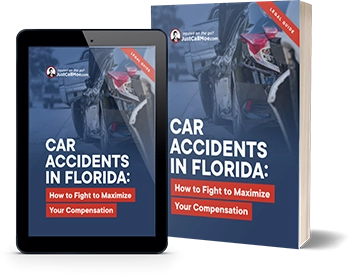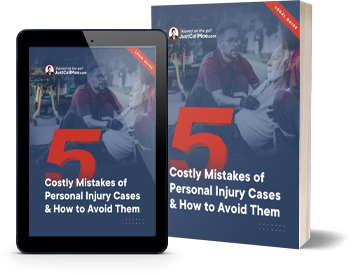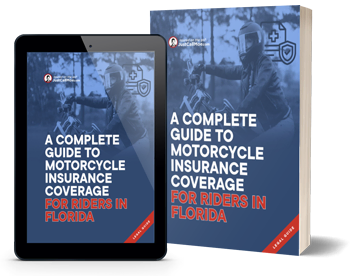Pain and suffering is often a significant part of an injury claim. As a victim, you need to know how pain and suffering damages are calculated.
Our Orlando personal injury attorney explains pain and suffering damages calculation in Florida.
How Are Pain and Suffering Damages Calculated in Florida?
There is no formula for calculating pain and suffering damages that is law in Florida. A victim can claim compensation for the actual pain and suffering that results from their injuries. There are several methods used to calculate the appropriate amount including a multiplier based on the severity of injuries and a daily amount to represent suffering during a period of recovery.
Calculating Pain and Suffering Compensation in Florida
There are multiple methods for calculating pain and suffering compensation in Florida. None of them are required by law, so ultimately, it’s up to the jury to decide what they think is most fair.
One common method is the multiplier method. It begins by totaling economic damages. Then, a multiplier is applied based on the severity of injuries. For minor injuries, the multiplier might be as low as .5. With a multiplier of .5, the victim would receive 1.5 times their total economic damages in compensation. When injuries are severe, the multiplier may be as high as 5.
Another method used to calculate pain and suffering is the per diem method. The per diem method assigns a daily dollar amount. For example, if the victim is going to recover over a two-year period, and their suffering is valued at $200 per day, their pain and suffering would be worth $146,000.
No method of calculation is exact – the jury may award the appropriate amount. It’s up to the plaintiff to submit evidence of how they have suffered physically and mentally from their injuries.
What Counts as Pain and Suffering in Florida Tort Law?
Pain and suffering – and compensation for it – is subjective in Florida tort law. Pain and suffering is generally recognized as the physical and emotional suffering that results from an injury.
Pain and suffering is a type of non-economic damage. (Florida Statutes § 766.202(8).) A person who suffers a physical injury experiences physical and emotional pain. While this suffering doesn’t directly result in economic loss, it is a type of loss that results from personal injury. The victim should be compensated for it.
Can You Sue for Pain and Suffering in Florida?
You can sue for pain and suffering in Florida in any personal injury claim that is not related to a motor vehicle accident, and in some car accident claims. To receive pain and suffering for a motor vehicle accident claim, injuries must meet the threshold of severity or permanence to fall outside the Florida no-fault system established by Florida Statutes § 627.737.
Pain and suffering in claims other than car accidents
Many tort claims have nothing to do with car accidents. (Slip and falls, dog bites, fires and defective products, for example.) In these cases, you can always claim applicable pain and suffering.
Pain and suffering in car accident claims
In car accident claims, a victim must have injuries that are serious or permanent to claim non-economic damages. Florida Statutes § 627.737 exempts vehicle owners and occupants with the required car insurance from tort liability resulting from ownership or use of a motor vehicle.
You may seek pain and suffering compensation for a car accident if you have:
- Significant, permanent loss of an important bodily function
- Permanent injury
- Scars (significant and permanent)
- A fatality
No-fault limitations do not apply if the victim suffers an injury that meets the threshold. The victim may seek pain and suffering compensation from the party responsible.
Does Florida no-fault insurance pay pain and suffering?
No-fault insurance does not pay for pain and suffering or other non-economic damages. To receive pain and suffering compensation, you must qualify to make a claim against the party responsible for the accident. Uninsured motorist coverage may provide pain and suffering compensation in cases of serious injury.
How Do You Prove Pain and Suffering in Florida?
The plaintiff must present evidence of their suffering. Evidence may include:
- Your own testimony of physical and mental pain resulting from the accident
- Testimony from family, friends and others that have observed and interacted with the victim
- Medical experts to explain how physical injuries cause pain
- Age of the victim and the expected duration of suffering
- Permanency of injuries
- Testimony of a counselor or psychologist about your emotional anguish
- Pre-existing conditions that may impact suffering
- Ongoing rehabilitation that will be necessary
- Information about the victim’s situation before the injury
- Disfigurement, scars and visible injuries
- Lifestyle losses and changes resulting from pain
The plaintiff must prove all elements of their claim, including compensable damages.
Are There Non-Economic Damages Caps in Florida?
- Generally, there are no non-economic damages caps in Florida tort claims, with some exceptions.
- A $500,000 limit on non-economic damages in medical malpractice claims was struck down by the Florida Supreme Court as unconstitutional. Florida Statutes § 766.118(2)(a); N. Broward Hosp. Dist. v. Kalitan, 219 So.3d 49 (Fla. 2017).
- In claims against government agencies, there is a $200,000 damages cap per person and $300,000 per incident. Florida Statutes § 768.28.
- When non-economic damages are recoverable, they may be reduced by comparative fault.
Remember, if a car accident claim falls under Florida no-fault law, non-economic damages are not awarded. If non-economic damages are compensable, there is no statutory cap in Florida unless the claim involves a government defendant.
How an Attorney Can Help
Sadly, the insurance companies often try to pay too little for pain and suffering. They’re hoping that the victims don’t understand how to value it. An attorney can determine what your case is worth and negotiate with the insurance company. At JustCallMoe, we help our clients receive fair compensation for pain and suffering.
Talk to a lawyer
For a personalized evaluation of pain and suffering in your case, and to get legal help, call (866) 225-5663 or message us now.

 (866) 225-5663
(866) 225-5663




 100% Secure and Confidential
100% Secure and Confidential